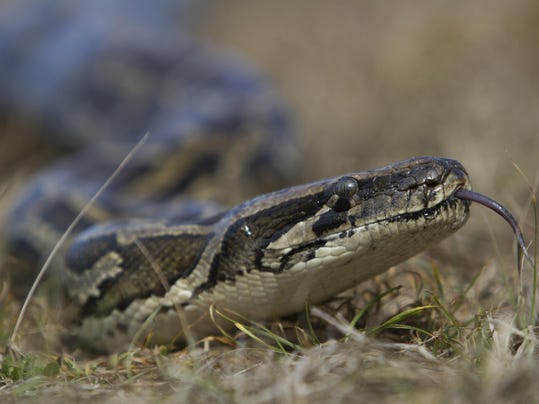A national environmental group has challenged the 2016 Python Challenge.
From Jan. 16 through Feb. 14, the Florida Fish and Wildlife Conservation Commission will hold its second competition to remove pythons from public lands in South Florida; this year, hunting grounds have been expanded to include parts of Everglades National Park.
Public Employees for Environmental Responsibility, based in Washington, D.C., oppose the park’s involvement because, among other things, hunting in U.S. National Parks is illegal, PEER executive director Jeff Ruch said. At fault, Ruch said, is Pedro Ramos, who became superintendent of Everglades National Park in January after five years as superintendent of Big Cypress National Preserve.
“This is about the unprofessionalism of park management, particularly the superintendent,” Ruch said. “He doesn’t have the statutory authority to allow a hunt in Everglades National Park. He just came from Big Cypress, where hunting is allowed: Perhaps he didn’t realize there’s no hunting in national parks.”
Ramos could not be reached for comment, but he is quoted in a recent press release about the 2016 Python Challenge as saying, “We look forward to expanding access into the park and to providing more opportunities for members of the public to become approved authorized python agents.”
In response to a letter from PEER to the National Park Service concerning the Python Challenge, park service officials are reviewing its authorized agent program, through which members of the public are trained to capture pythons in and remove them from Florida’s national parks, spokesman Bill Reynolds said.
According a Project Synopsis for the program: “Within the Parks, existing regulations prevent ‘hunting’ and removal of wildlife from the Parks. Through the authorized agent program, members of the public are authorized to participate in python removal as ‘agents of the NPS.'”
Reynolds also said the service would “not respond to name-calling” or to specific concerns raised by Ruch to The News-Press. “The review will be complete next week and will address all of PEER’s questions,” Reynolds said. “I can’t speculate on what the results of the review are going to be.”
Burmese pythons are non-natives and a major ecological concern in South Florida because they are apex predators that feed on many native mammal, bird and reptile species. Pythons were first documented in Everglades National Park in 1979, and more than 2,000 have been removed from the park since 2000.
FWC held the first Python Challenge in 2013 in four Wildlife Management Areas, which are managed by FWC; Everglades National Park was not part of the 2013 event. About 1,600 people from 38 states, the District of Columbia and Canada registered for the 2013 challenge; FWC officials don’t know how many people actually participated, but those who did removed 68 Burmese pythons.
In the 2013 Python Challenge, cash awards were given for most and longest pythons captured; categories for the 2016 challenge haven’t been determined, but awards will be given for the longest snakes captured, according to FWC spokeswoman Carli Segelson.
“This is not an Everglades National Park activity,” Ruch said. “It’s an FWC activity, billed as a competition with awards. If you let this kind of thing in National Parks, it would set a precedent, and you’d have competitions in National Parks to see who can shoot the biggest bison. It would change the character of National Parks.”
FWC officials didn’t want to weigh in on PEER’s concerns, Segelson said. Another PEER complaint is that Ramos didn’t take steps to make sure capturing pythons in Everglades National Park complies with the National Environmental Policy Act, which requires national agencies to assess environmental effects of proposals before making decisions.
“The last time they did this, they had 1,600 people, and this one is supposed to be bigger,” Ruch said. “So, say you have 2,000 people tromping through the Everglades, capturing things they think are snakes. We don’t know what collateral damage it will have. A NEPA analysis would lay that out.
“This is like the Mickey Rooney Andy Hardy movies, where he says, ‘Hey, kids, my uncle has a barn: Let’s put on a show,’ except it’s the superintendent saying, ‘I got a National Park: Let’s put on a high-profile python hunt.'”
Source: Environmental group challenges 2016 Python Challenge

